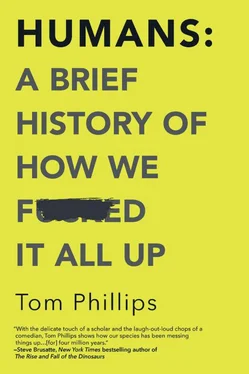Tom Phillips - Humans - A Brief History of How We F*cked It All Up
Здесь есть возможность читать онлайн «Tom Phillips - Humans - A Brief History of How We F*cked It All Up» весь текст электронной книги совершенно бесплатно (целиком полную версию без сокращений). В некоторых случаях можно слушать аудио, скачать через торрент в формате fb2 и присутствует краткое содержание. Город: Toronto, Год выпуска: 2019, ISBN: 2019, Издательство: Hanover Square Press, Жанр: История, Юмористические книги, на английском языке. Описание произведения, (предисловие) а так же отзывы посетителей доступны на портале библиотеки ЛибКат.
- Название:Humans: A Brief History of How We F*cked It All Up
- Автор:
- Издательство:Hanover Square Press
- Жанр:
- Год:2019
- Город:Toronto
- ISBN:978-1-48805-113-5
- Рейтинг книги:4 / 5. Голосов: 1
-
Избранное:Добавить в избранное
- Отзывы:
-
Ваша оценка:
- 80
- 1
- 2
- 3
- 4
- 5
Humans: A Brief History of How We F*cked It All Up: краткое содержание, описание и аннотация
Предлагаем к чтению аннотацию, описание, краткое содержание или предисловие (зависит от того, что написал сам автор книги «Humans: A Brief History of How We F*cked It All Up»). Если вы не нашли необходимую информацию о книге — напишите в комментариях, мы постараемся отыскать её.
Humans: A Brief History of How We F*cked It All Up — читать онлайн бесплатно полную книгу (весь текст) целиком
Ниже представлен текст книги, разбитый по страницам. Система сохранения места последней прочитанной страницы, позволяет с удобством читать онлайн бесплатно книгу «Humans: A Brief History of How We F*cked It All Up», без необходимости каждый раз заново искать на чём Вы остановились. Поставьте закладку, и сможете в любой момент перейти на страницу, на которой закончили чтение.
Интервал:
Закладка:
In the darkness, without Blondlot noticing, he reached out and simply pocketed the prism. Unaware that his equipment was now missing its vital component, Blondlot continued to read out wavelength results for a spectrum that shouldn’t have been there anymore.
Wood summarized his findings in a politely brutal letter to Nature in the autumn of 1904: “After spending three hours or more in witnessing various experiments, I am not only unable to report a single observation which appeared to indicate the existence of the rays, but left with a very firm conviction that the few experimenters who have obtained positive results have been in some way deluded.” After that, interest in N-rays collapsed, although Blondlot and a few other true believers kept on plugging away, determined to prove that they hadn’t just been studying a mirage all this time.
The stories of both polywater and N-rays are cautionary tales about how even scientists can fall prey to the same biases that affect us all, but they’re also tales of science… well, working. While the hype around them both was, in retrospect, more than a little embarrassing for quite a lot of highly qualified professionals, neither mania lasted for more than a few years before skepticism and the need for hard evidence won out. Go, team.
But if these examples are relatively harmless, there have been plenty of instances where dodgy science has done a lot more than merely leave some people with bruised reputations. Like, for example, the legacy of Francis Galton.
Francis Galton was undoubtedly a genius and a polymath, but also a creepy weirdo who had terrible ideas that led to dreadful consequences. A half cousin of Charles Darwin, he achieved breakthroughs in multiple disciplines—he was a pioneer of scientific statistics, including inventing the concept of correlation, and his creations in fields as diverse as meteorology and forensics are still with us today, in the form of the weather map and the use of fingerprints to identify people.
He was obsessed with measuring things and applying scientific principles to just about everything he came across—his letters printed by Nature include one estimating the total number of brushstrokes in a painting (after he got bored in lengthy sittings for a portrait), and another in 1906 entitled “Cutting a Round Cake on Scientific Principles” (in short: don’t cut wedges, cut straight slices through the middle, so you can push the remaining halves together to stop them drying out).
But this obsession went further than coming up with extremely British teatime life hacks. In one of his more infamous investigations, Galton toured the towns and cities of Britain in an attempt to create a map of where the women were most attractive. He would sit in a public space and use a device concealed in his pocket called a “pricker”—a thimble with a needle in it that could puncture holes in a piece of marked paper—to record his opinion of the sexual desirability of every woman who walked past. The end product of this was a “beauty map” of the country, much like his weather maps, which revealed that the women in London were the most attractive, while the women in Aberdeen were the least attractive. At least, according to the tastes of a pervy statistician furtively making notes on women’s fuckability with a needle hidden in his pocket, which perhaps isn’t the most objective of measures.
It was that same combination of qualities—a compulsion to measure human traits and a complete lack of respect for the actual humanity of the people being measured—that led Galton to his most infamous contribution to the world of science: his advocacy of, and indeed coining of the term, eugenics . He believed firmly that genius was entirely inherited, and that a person’s success came from their inner nature alone, rather than fortune or circumstance. And so he believed that marriages between people deemed suitable for breeding should be encouraged, possibly with monetary rewards, in order to improve the stock of the human race; and that those who were undesirable, such as the feebleminded or paupers, should be strongly discouraged from breeding.
In the early part of the twentieth century, there was worldwide uptake of the eugenics movement, with Galton (now near the end of his life) seen as its hero. Thirty-one US states passed compulsory sterilization laws—by the time the last had finally been repealed in the sixties, over 60,000 people in mental institutions in the United States had been forcibly sterilized, the majority of them women. A similar number were sterilized in Sweden’s efforts to promote “ethnic hygiene,” where the law wasn’t repealed until 1976. And of course in Nazi Germany… well, you know what happened. Galton would no doubt have been horrified if he’d lived long enough to see what was being done in the name of the “science” he created, but that doesn’t make his original ideas any less wrong.
Or there’s Trofim Lysenko, the Soviet agricultural scientist whose profoundly bad ideas contributed to famines in both the USSR and (as mentioned way back in Chapter 3) China. Unlike Galton, Lysenko doesn’t even have actual legitimate scientific advances to even out his legacy. He was just inordinately wrong.
Lysenko came from a poor family, but quickly rose through the ranks of Soviet agronomy thanks to some early successes in stimulating seeds to grow without needing to be planted over the cold winters. He eventually became a favorite of Stalin, which gave him enough power to start imposing his ideas on the rest of the Soviet scientific community.
Those ideas weren’t right—they weren’t even close to being right—but they did have the advantage of appealing to the ideological biases of Lysenko’s communist overlords. Despite the fact that genetics was a pretty well-established discipline by the 1930s, Lysenko rejected it entirely, even denying that genes existed, on the grounds that this promoted an individualistic view of the world. Genetics suggested that organisms’ behaviors were fixed and unchanging, while Lysenko believed that changing the environment could improve the organism and pass those improvements down to its offspring. One species of crop could even turn into another, given the right environment. Rows of crops should be planted more closely together, he instructed farmers, because plants of the same “class” would never compete with each other for resources.
None of these things was true, and what’s more they were very obviously not true, as evidenced by the fact that attempts to put them into practice just ended up with a lot of dead crops. That didn’t stop Lysenko maintaining his political power and shutting down any criticism—to the point of having thousands of other Soviet biologists sacked, imprisoned or even killed if they refused to abandon genetics and embrace Lysenkoism. It wasn’t until Khrushchev was forced out of power in 1964 that other scientists finally managed to persuade the party that Lysenko was a charlatan, and he was quietly shuffled out. His legacy was to contribute to millions of deaths, and to set the field of biology in the Soviet world back decades.
But if Lysenko’s mistakes in biology were entirely enabled by communism, the next case was pure capitalism—the tale of a man who managed to make not one, but two of the most disastrous mistakes in the history of science, all within the space of one decade.
In 1944, the genius engineer, chemist and inventor Thomas Midgley Jr., a man whose discoveries had helped shape the modern world to a remarkable degree, died at home in bed at the age of 55.
Dying at home in bed sounds quite peaceful, you’d think. Not in this case. Paralyzed below the waist due to a bout of polio some years earlier, Midgley disliked the indignity of being lifted in and out of bed, and had put his talent for innovation to good use, building himself an elaborate system of pulleys so he could do it himself. Which was all going terribly well until that day in November, when something went a bit wrong and he was found strangled to death by the ropes of his own device.
Читать дальшеИнтервал:
Закладка:
Похожие книги на «Humans: A Brief History of How We F*cked It All Up»
Представляем Вашему вниманию похожие книги на «Humans: A Brief History of How We F*cked It All Up» списком для выбора. Мы отобрали схожую по названию и смыслу литературу в надежде предоставить читателям больше вариантов отыскать новые, интересные, ещё непрочитанные произведения.
Обсуждение, отзывы о книге «Humans: A Brief History of How We F*cked It All Up» и просто собственные мнения читателей. Оставьте ваши комментарии, напишите, что Вы думаете о произведении, его смысле или главных героях. Укажите что конкретно понравилось, а что нет, и почему Вы так считаете.












